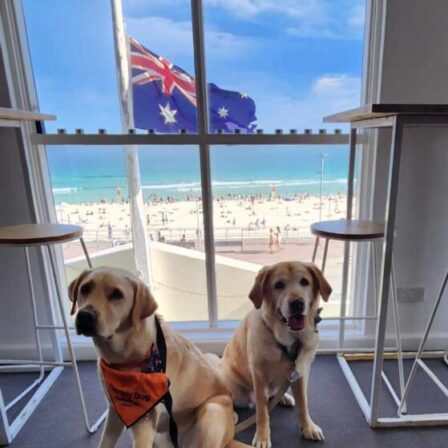News
The isolating effects of low vision you can’t see
- By 2020, half a million Australians will be living with low vision
- A staggering 67% of people have felt depressed as a result of their vision impairment
- 70% feel anxious in social situations – this rises to 77% of men
Every day, an Australian family learns someone they know, or love is losing their sight. According to the latest statistics from a Centre for Eye Health report*, by 2020, over half a million Australians will be living with low vision.
The latest client study** from Guide Dogs NSW/ ACT, the leading provider of Guide Dogs and orientation and mobility services for people with vision impairment, suggests the emotional and psychological impacts of low vision are far greater than we think.
A staggering 67% of respondants say they have felt depressed, and over a tenth (12%) have felt loneliness every single day.
An overwhelming number (92%) feel society could do more to recognise the daily struggles those experiencing low vision go through, with 43% of the opinion that there is a taboo around discussing low vision – interestingly, men feel more aware of the taboo than women (48% vs 36%).
Bullying and discrimination has affected 65% of those polled as a result of their vision impairment – again, men feel the effects of this more. Three quarters of men (74%) have felt actively discriminated against, compared to just half (53%) of women. One third (33%) of those living with low vision also say their career has been impacted, with 22% currently unemployed, spanning across all ages.
CEO of Guide Dogs NSW/ ACT, Dale Cleaver comments: “With the number of people living with low vision set to increase to over half a million Australians by 2020, the demand for support from Guide Dogs NSW/ ACT is also going to increase.”
“Our client study highlights how prolific experiencing moments of depression and loneliness is for those experiencing low vision and this needs to be addressed as a matter of urgency. The support and services provided by Guide Dogs NSW/ ACT enables independence and connection to community. Essentially, we provide people living with low vision a best friend – someone to guide and support them through this difficult journey and to help overcome these very real daily challenges.”
“Guide Dogs NSW/ACT’s services span much more than Guide Dogs themselves. We offer expert, practical support through daily living skills, orientation and mobility training, as well as specialist technology training, so our clients can stay connected to their community and with the people they love,” said Mr Cleaver.
“Our goal is to make sure no one has to face low vision alone, so no one is left out of life. With more and more Australian’s losing their sight every day, public support has never been more needed.”
The data also revealed that one third (35%) of client study respondants feel disconnected from society and like their world was shrinking as a result of low vision (30%).
“Despite the slow deterioration of my sight over the years, nothing can prepare you for the hardships low vision brings, particularly so in adult life,” explains Guide Dogs NSW/ ACT client, Shayne Allen who lives with a hereditary eye condition, Retinitis Pigmentosa.
“I am beginning to feel like a burden on people, especially on my wife and even my colleagues at work, who at times have to stop and read things for me – it really knocks my self-esteem, having to ask for help all of the time.
“As a parent with two kids and a mortgage, there is also fearfulness and uncertainty of the future due to the nature of my condition. My eldest daughter has recently started school too, which has brought up more emotions – I’m finding it hard to deal with the fact I can’t help her with her homework, and other elements of her growing up I can’t be involved with due to my low vision.
“I try to remain as positive as possible, there’s no use getting down about something out of my control, but it’s the support I’ve received from my beautiful wife, kids and loved ones, as well as my trusty Guide Dog, Bree which enables me to keep going.”
One fifth (19%) of client study respondents reveal they felt life wasn’t worth living before seeking support. James Bennett, Guide Dogs NSW/ ACT client, can attest to this stating, “I went from the world of sight to darkness overnight. I was in was in a pit of depression and Guide Dogs was a part of my journey getting out of it.”
There are a number of easy ways to get involved with Guide Dogs NSW / ACT as well, please visit: https://nsw.guidedogs.com.au/how-you-can-help / here to find out more or to donate: https://nsw.guidedogs.com.au/donate
ABOUT THE RESEARCH
*The Centre for Eye Health is an initiative of Guide Dogs NSW/ACT and the University of New South Wales. CFEH provides state-of-the-art eye imaging and visual-system diagnostic services to the general community at no charge to the patient, with the aim of reducing preventable low vision or blindness within the community.
**Guide Dogs NSW / ACT commissioned PureProfile to conduct an online survey in March 2019. The findings were based on a study conducted with Guide Dogs NSW/ ACT client database – 1,268 people were targeted and 169 were spoken to.






